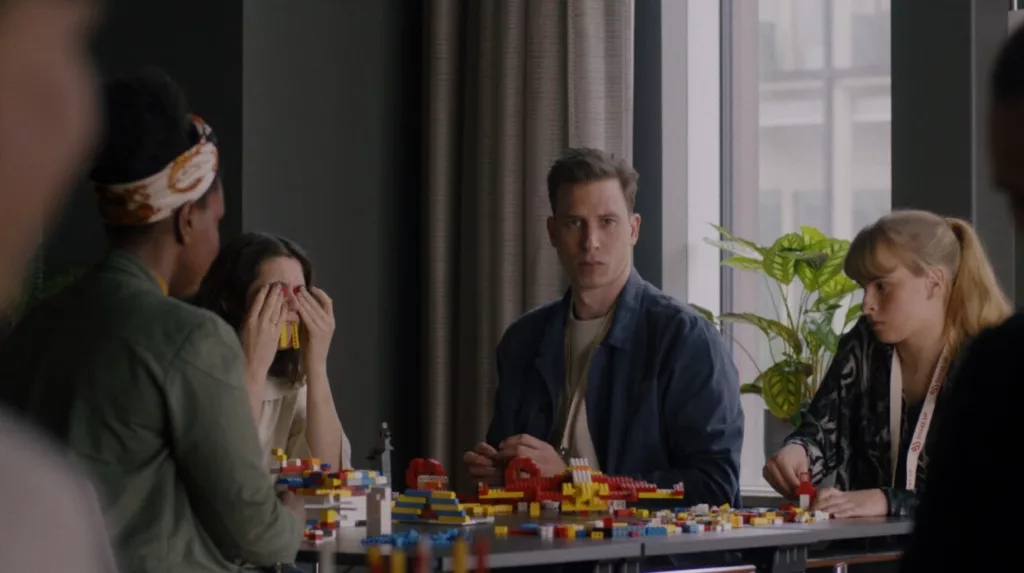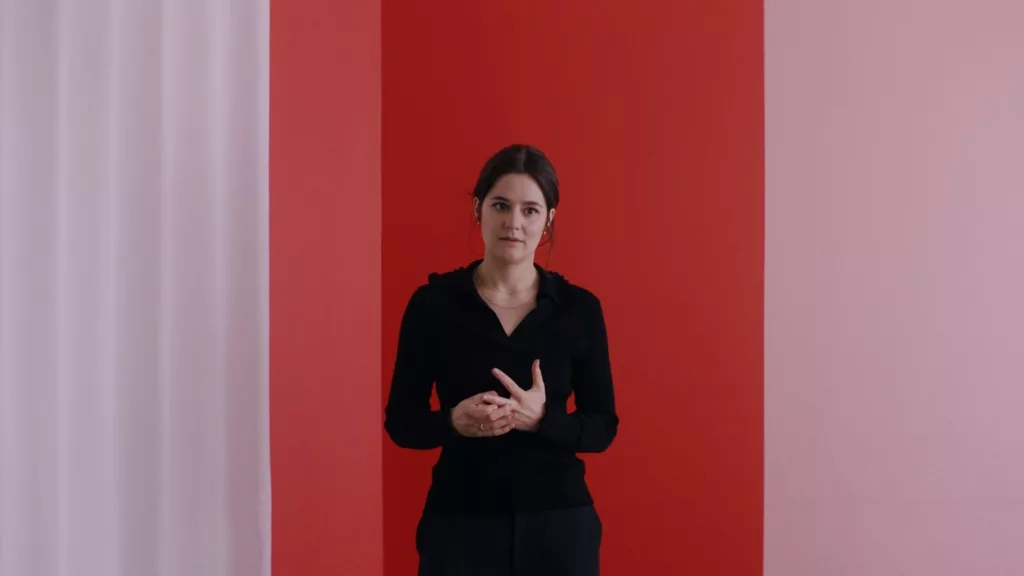Ernst De Geer’s directorial debut, The Hypnosis, takes viewers on an unpredictable journey through one couple’s unraveling. Asta Kamma August and Herbert Nordrum play Vera and André, partners in both business and life. Vera and André have poured their hearts into founding Epione, an app aimed at improving women’s health globally. As they prepare their big pitch at an entrepreneurs’ conference, Vera visits a hypnotherapist, hoping to kick her smoking habit. The session leaves her with much more than that, though: Vera comes away unshackled, her true self bursting free.
At first, Vera’s new confidence seems positive. But behind the scenes, André grows uneasy as Vera’s behavior becomes harder to reckon with. What’s meant to be a career-making weekend rapidly transforms into a minefield as Vera follows wherever her liberated instincts may lead. Commanding attention with her radiant performance, August brings Vera to life in all her mystery. As the couple drifts apart, questions emerge around autonomy versus obligation in relationships. By peeling back the layers of this unraveling partnership, De Geer crafts a compelling tale of someone unhinged—and the tremors that send through one couple’s foundation.
The Unleashing of Vera
Vera and André seem to have it all figured out. The young couple jointly founded Epione, an app aimed at improving healthcare access for women worldwide. Driven by Vera’s own experiences with a rare blood condition, their mission feels deeply meaningful. All their focus is on Shake Up, a startup conference where they’ll pitch Epione to potential investors.
A last-minute addition of hypnotherapy to aid her smoking leads to an unexpected change. Rather than simply quitting nicotine, the session unleashes an altered Vera. Where she was once reserved, she now brims with confidence. But this new manifestation offers more than empowerment alone.
Vera’s liberated mind expresses itself unconventionally. At Shake Up’s welcoming mixer, she entertains strangers with antics like an imaginary chihuahua. André grows concerned by her disruptive behavior but is unprepared for what’s to come. During their big presentation, Vera derails the polished speech with blunt criticism.
Her outrageous conduct draws attention, including from seminar guru Julien. But it deeply embarrasses reliable André as he fights to keep their dream afloat. As Vera careens further beyond propriety, insulting other attendees, André struggles just to maintain dignity. Privately, cracks in their bond start to show.
Days pass with escalating unease. Vera casually pours herself drinks and shouts at nonexistent dogs. André’s attempts to rationally rein her in fail. At a crunch point, desperation drives an unwise choice. But new perspectives also emerge, shining light on the held-back elements of Vera and André’s relationship. By the climactic finale, the prospect of real change hovers in the air.
Liberation and its Limits
This film delves into timely themes that will resonate widely. Vera and André’s story shines a light on gender roles, modern relationships, and the constraints we impose, intentionally or not, on ourselves and our partners.
Vera has long stifled her authentic self to please others and avoid conflict. But her hypnotherapy unleashes buried parts of her personality. At first, it’s liberating to see Vera empowered and comfortable speaking her mind. Her playful nature also emerges without inhibitions holding it back.
Yet André grows ever more unsettled as Vera’s behavior turns erratic and inconsiderate. Their power dynamic shifts as she prioritizes her newfound freedom over their partnership. This highlights how easily equality can slip away when one person changes in ways the other isn’t prepared for.
Their contrasting arcs pose profound questions about what “progress” means in an intimate bond. Both characters feel restricted by societal pressures, but finding balance is challenging. Respecting your own needs while also caring for your partner’s is a delicate task with no easy answers.
The movie also shines a light on startup culture. The app’s noble goals are overshadowed by some empty networking and posturing. Presentations are designed to impress rather than inform. Overly slick personas mask passion underneath, and priorities become muddled.
While skewering excesses effectively, it avoids simple critiques. Ambitions for social good still drive the characters amid doubt and imperfection. No one is exempt from the struggle reconciling public ideals with private turmoil.
Overall, this film wrestles with self-actualization and its discontents in relationships and careers. It portrays the messiness of growth with empathy for all walks of life. And it reminds us that liberation, for individuals or causes, requires care, communication, and compromise.
Committed Performances: Beneath Sharp Direction
De Geer draws the audience into this film’s peculiar world through deft stylistic maneuvers. Sparse close-ups in the hypnotherapy scene immediately plunge us into Vera’s inner experience without explanation. From there, detached shots observe the characters like specimens in Petri dishes. This lends an examining eye to their behaviors and fosters unease.
Cinematographer Bjerstedt lenses the proceedings in clean Nordic tones that feel clinical and controlled, much like the tech seminar’s packaging of lofty ideas. Space is tightly framed, trapping subjects in frames to uncomfortable degrees. Even relaxed moments feel tinged with tension through these restless compositions.
It’s a testament to the lead actors that they maintain such layered performances within this watchful, almost punishing visual approach. Asta Kamma August is utterly fearless as Vera careens down uncharted paths. She fearlessly lays her character’s most intimate and erratic phases bare for judgment, imbuing even the darkest turns with vivacious spirit.
Likewise, Herbert Nordrum subtly captures every flick of anguish and faltering sense of self crossing André’s face. He’s brilliant at expressing a life thrown off-center through tiny gestures and glances, even as those around him act aloof. The empathy created for his plight is largely due to Nordrum’s touchingly natural work.
Together, they form a living contrast between liberation and its ripple effects that holds nuanced insights. De Geer steers them to emotive ends through a direction as ruthlessly exacting as the tech world it dissects. When in less sure hands, such material could veer didactic or strange. But under his precise, challenging vision and their committed performances, this film burrows profoundly into questions of change and connection between people.
Twists in Self-Knowledge and Fallout for Relationships
Vera’s hypnotherapy sparks an unexpected voyage of revelation. Freed from constraint, her spirit awakens yet leads down winding paths. As new facets emerge, so too do ripples that challenge those close to her.
We see how suppression shaped her through domineering relationships. But releasing walled gardens brings weeds along with flowers. Unbound, joy, and chaos intertwine. Her antics amuse, though pushing propriety risks losing those who can’t follow daring steps off the well-trod way.
André had depended on predictability, winning through his partner’s compliance. When foundations shift beneath accustomed routines, panic sets in. He clings to earlier versions of Vera, shaken by a force remaking the landscape. Yet we feel his plight, watching all he knows slip like sand through grasping fingers.
Their bond strains under these quakes of selfhood. The movie highlights the dependence plaguing many dynamics, where one finds stability at the cost of another’s freedom. But it also questions whether true bonds can survive such changes or if all relationships depend on forms over spirits.
Ultimately, Vera’s case underlines empowerment as a meandering road, not a clean arrival. Her journey mirrors the fits and starts of finding an authentic voice after living through the echoes of others’. The film deserves credit for peering into such thorny areas, even if solutions remain elusive. In showing how hurt can stem from help, it sparks thoughts on supporting those around us as we all struggle to know ourselves.
Insight into Discomfort with Humor
Hypnosis proves remarkably adept at tapping the comedic potential of unease. Through Vera’s uninhibited acts, it shines light on tensions brimming just beneath everyday interactions. De Geer directs with care, coaxing laughs from moments testing even the boldest viewer’s nerves.
The startup seminar serves as a prime target. Its characters coast by on blithe platitudes, blinded to how their professed ideals clash with insufferable airs. Observing them grapple with Vera’s disruptions proves endlessly amusing, as she punctures facades shielding pomposity and posturing. Her antics, while pushing limits, feel a fair retort to those insulating true meaning behind smiles and slogans.
Not that the movie relishes others’ distress; it handles a tricky line with nuance. Humor arises from recognizable foibles, not ridicule. When focus shifts to André’s plight, empathy grows for a man simply yearning for connection. His flaws stem not from flaws but from fishing for belonging in strange waters. Compassionate tempers cringe at his cost.
Through it all, an awkward essence rings true. Disjointedness, crossed signals, and moments skirting calamity—such common bits furnish this story’s heart. By bringing kindred discomforts to the fore, the hypnosis sparks smiles of shared understanding. Its genius lies in lending levity, not judgment, to situations everybody stumbles into at one time or another.
Insightful Debut, Empathetic Impact
The hypnosis showcases De Geer’s command over delicate subject matter. While not perfect, his direction demonstrates talent attuned to relationship nuances and society’s pressures.
Asta and Herbert turn in indelible performances. Asta brings Vera’s liberation to life with captivating vigor, laying bare her character’s trauma. Herbert conveys André’s unraveling with excellent subtlety, eliciting sympathy amid comedy. Together, they forge a compelling partnership, but its disintegration is sadly realistic.
The film deserves credit for tackling interpersonal dynamics and cultural critiques that surely resonate with many. Its willingness to spotlight awkward moments and hard conversations, however tactfully handled, sets an example that others would do well to follow.
While certain aspects could have been stronger, De Geer achieves his clear aim of provoking thought while entertaining. The Hypnosis leaves its marks not through accusations but through shared recognition. Its empathy ensures viewers reflect personally on pressures faced daily, within and outside relationships.
For a directorial start, this shows keen insight into what binds and divides people, handling complexity with care. De Geer’s evolving skill seems certain to yield even more illuminating portraits of human experience in the future.
The Review
The Hypnosis
In summary, The Hypnosis is an accomplished directorial debut that pens an insightful satire on modern relationships and societal dynamics. De Geer tackles complex issues of gender, identity, and interpersonal expectations with nuance and care. August and Nordrum deliver captivating lead performances that anchor this empathetic exploration of lives confronted with uncertainty. While not perfect, the film stimulates thought and resonates effectively through its vivid yet tactful portrayal of universal human experiences.
PROS
- Compelling lead performances that generate empathy
- Astute social commentary on relationships and cultural pressures
- Poignant examination of identity and willingness to confront discomfort
- Naturalistic dialogue and believable characters
CONS
- The narrative loses some coherence in the latter third
- Fails to fully reconcile the arcs of the two main characters
- Leaves some ambiguity around the implications of Vera's change






















































Discussion about this post